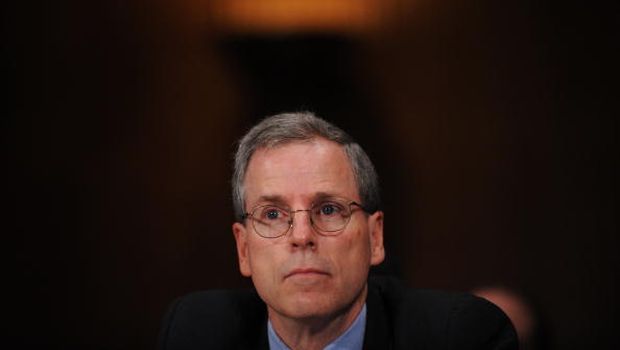
Ambassador Robert Ford appears before a full committee hearing on his nomination to be ambassador to Syria at the Dirksen Senate Office Building in Washington (AFP)
A source within the Syrian opposition, speaking to Asharq Al-Awsat on condition of anonymity, said: “The Islamic Front received an invitation from the US administration through mediators to discuss the possibility of returning to work under the umbrella of the Free Syrian Army (FSA), but it has not responded yet.”
A spokesman for the Ahrar Al-Sham group within the Islamic Front, Abu Majd Al-Shami, told Asharq Al-Awsat that no meeting had taken place with Ford and dismissed the possibility of a meeting taking place soon.
He did not, however, rule out meeting with American officials in the future, and said: “Everything depends on the interests of our people in the future, and decisions would be made according to developments.”
Meanwhile, an official of the Islamic Front’s political bureau, Abdallah Al-Hamawi, denied the reports and said they were “lies, and their objectives were clear, and we will not allow them to cause sedition”.
He added on his Twitter account that the Islamic Front “will not fight the Al-Qaeda organization because it [Islamic Front] was founded to form a link for jihadists”, and that it would not fight a proxy war or cause division between the jihadists.
Opposition sources said the Islamic Front was faced with two difficult options—if it accepted dialogue with the Americans it would put itself in confrontation with the extremist forces of the Islamic State of Iraq and Syria (ISIS) and the Al-Nusra Front, which would accuse it of being an agent of the West, while if it rejected dialogue, it would become distant from the international community.
The sources suggested “the timing of the US invitation extended to the Islamic Front after it took control of FSA positions aims at pressuring the Islamic Front to return to work with the FSA.” The US had expressed concerns about the control by the Islamic Front of former FSA positions at the Bab Al-Hawa border point with Turkey, and had suspended its aid to the FSA as a consequence.
Meanwhile, representative of the Syrian National Coalition in the United States, Najib Al-Ghadban, told Asharq Al-Awsat that the US invitation was part of a US and opposition policy aimed at bringing all “moderate” opposition forces under one umbrella to confront government forces and extremist forces such as ISIS and the Al-Nusra Front.
Ghadban said: “Islamic Front leaders [have] previously held meetings with American politicians … The second meeting, if it took place, would lead to decisions which would not include provision of arms.”
He called on the Islamic Front to adhere to the principles of the revolution and avoid extremism, and said he hoped “its factions would join the FSA in a united front against the Syrian regime”.
The Islamic Front was formed by six groups of Islamist opposition fighters in Syria frustrated with the FSA and the Syrian opposition’s political leaders outside Syria. It recently took control of the headquarters and supply depots of the FSA on the Syrian-Turkish border, raising fears in the West that the Syrian opposition was being taken over by religious extremists.
